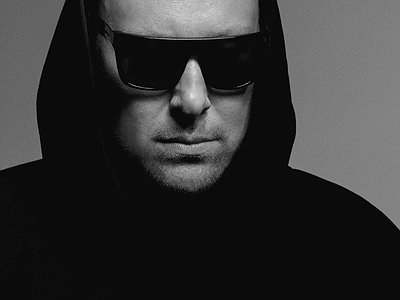Can you describe your state of mind during a DJ set? What supports this ideal state of mind and what are distractions? Are there strategies to enter into this state more easily?
One major distraction are people who are standing in front of the DJ booth and are trying to get into it. I’ve never understood where this need is coming from but there’s always couple of heroes trying to do that and that makes me nervous as they can pull some wire, move my setup or even spill their drinks over it.
Regarding the state of mind: this is not always the same. I’m not taking drugs, which means I can come to the DJ booth fresh or tired, up for a party or not so into it. One thing I really like to do if there’s enough time is to take a short nap before my set. This disco nap puts me into my comfort zone, and when I come to the gig I’m relaxed and focused on what I do. It gives me a feeling I am controlling everything. And if the crowd responds well I can get lost in music at some point and get into a trance while I’m mixing. I can’t really describe this feeling. The easiest would be to say I become one with the music. I’m not even sure if I like it or not, but at the same time I can’t say it really bothers me. :-)
What are some of the considerations that go into deciding which track to play next? What makes two tracks a good fit? How far do you tend to plan ahead during a set?
If people are responsive and everything goes well you just follow the sound and play one track that fits after another and so you build a story. Sometimes I listen to a track at home and it doesn’t strike me as particularly good, but then I play a two or three-minute part of it in a set and it sounds amazing. Or you play a particular track ten times in ten different countries and it always works and then you misread the crowd or you play in the territory you’re not so popular in and it fails. One way to get out of that is to play big tracks to get people on your side but that disturbs the mood and you have to build the energy on the dancefloor again. It’s not that people will leave the dancefloor if something like that happens, but the perfection is ruined.
I don’t plan my sets much though. When I go on stage I have an idea what I’d like to play, and sometimes I do, but sometimes I don’t. A gig is an interaction between a DJ and the crowd and you have to read it and respond to it and building on this two-way energy flow you can create a great story – but it can be something totally different than you’ve planed or expected when you’ve played the first track of your set. For example, in Lehmann club in Stuttgart I always play a bit darker and I enjoy watching people on the dancefloor when I take them into something that resembles mass hypnosis. I always know what to expect there and I can prepare in details and think in depth how can I surprise and treat that crowd with some particular tracks. But the next day I play another club and I can’t plan beyond the next two tracks I’m going to play.
Would you say you see DJing as improvisation? As composition in the moment? Or as something entirely different from these terms?
Of course it’s more or less improvisation, but it’s not working perfectly each and every time. I’m satisfied if the set turns out 98% of how I want it to be. But that’s only in my head. People can’t notice that. We’re talking details – when two out of 20 tracks didn’t blend in the mix perfectly. I always thrive to play the perfect mix, but as we have to improvise they can’t all turn out just like that.
How do playing music at home and presenting it in the club compare and relate? What can be achieved through them, respectively, and what do you personally draw from both?
When you play a track in a club, that’s part of a bigger picture: you’re in an environment that is built to play and enjoy the music, there’s a sound system, light, big screens, special effects, people on the dancefloor, which all adds to the experience, so most of the music we produce and play sounds better in that kind of environment. When you listen to music in a more intimate environment you are trying to explore other feelings. That’s also one of the reasons why most of the deejays don’t play the same music at the afterhours or in a small club as they do at the festivals.
How would you describe the relationship between your choices and goals as a DJ and the expectations, desires and feedback of the audience? How does this relationship manifest itself during a performance and how do you concretely tap into it?
People who know me as an artist know what to expect at my gigs and luckily most of the people who come to my gigs are my fans or at least they like the music that I play. So most of the gigs are great and we create a great energy on the dancefloor.
Especially thanks to the storage facilities of digital media, DJ sets could potentially go on forever. Other than closing time, what marks the end of a DJ performance for you? What are the most satisfying conclusions to a set?
There’s no unambiguous answer. We get approval from the crowd from the moment we step on stage and the first sound drops. The greatest satisfaction for me is when I can play music that I like and people really enjoy it. How you finish this journey is again conditioned with everything I’ve listed above: where you play, which slot, who else is on the bill with what kind of music … Lately I’m closing my sets with some good electro tracks, but again that’s not a rule I wouldn’t be breaking regularly. It can also be one of my greatest hits, usually in a new edit, or some classic tune. The perfect scenario for me it is to finish the set with the greatest track at the peak of the energy.
Art can be a purpose in its own right, but it can also directly feed back into everyday life, take on a social and political role and lead to more engagement. Can you describe your approach to art and being an artist?
If you are an artist you have to be engaged in some way and you have to at least try to share your vision with the audience. I don’t think I’m an artist all the time. When I’m working on something new and try to materialize my vision of music just the way I imagined it (I’m on one of this journeys for the last year and a half and I’ll need couple of more months at least to develop the sound I’d like to) I suffer and I’m an artist. Then at some point, when I finally develop the sound I want, I become a craftsman and do things almost automatically for some period of time. Though sometimes I just enjoy creating and playing music because something sounds beautiful and triggers nice emotions. I’m not sure if I know how to tell something with or through my music but I know how to build a good energy and make people move. I don’t understand ballet or opera, I don’t understand most of the fine arts, maybe some design – and even there I only listen to my senses if I find something beautiful or not. The only art I really understand is music.



